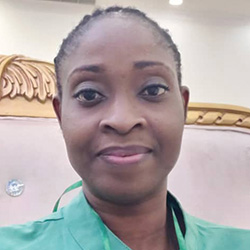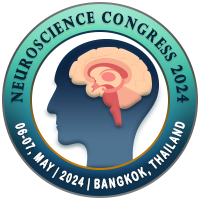
Ijeoma Okwudire-Ejeh
Asokoro District Hospital, NigeriaTitle: Demographic and Diagnostic Spectrum of Neurosurgical Biopsies: Initial Experience from a Re-established Neurosurgical Unit in a Tertiary Hospital in North Central Nigeria
Abstract
Introduction
Neurosurgical biopsies are obtained from lesions of the central nervous system, comprising the skull, brain, spine, spinal cord, and nerves. Neurosurgery practice is a highly specialized field with wide disparities related to access to care, especially in developing countries where there are few specialists and poor support care for patients. After over 20 years of redundancy, the neurosurgical unit in Jos University Teaching Hospital (JUTH), Jos, Plateau State, Nigeria, was re-established to meet the needs of patients in the area of neurosurgery. The aim of the study is to document the demographic and diagnostic spectrum of neurosurgical biopsies obtained in JUTH in the first five years of the re-establishment of its neurosurgical unit, highlighting the need for inclusion of neurosurgical services in health planning and resource allocation; and to compare these findings to similar studies elsewhere.
Materials and methods
This was a retrospective, descriptive, hospital-based study of neurosurgical lesions diagnosed in the Department of Histopathology at JUTH between January 2011 and December 2015. One hundred and forty-five lesions met the inclusion criteria out of 151 in the records and were studied. Archival slides of these neurosurgical biopsies were retrieved, and fresh sections were re-cut and stained with hematoxylin and eosin (H&E) where necessary. The diagnoses of some of the neoplastic lesions were confirmed by immunohistochemistry. The data obtained was analyzed, and the results are presented as tables, bar charts, ratios, and percentages.
Results
Thirty-one different lesions were diagnosed. The lesions most commonly diagnosed were traumatic/degenerative intervertebral disc, 54/145 (37.2%); neoplastic, 48/145 (33.1%); and congenital, 31/145 (21.4%), while inflammatory/infectious, 9/145 (6.2%); and vascular, 3 (2.0%) lesions were the least. Bimodal peak frequencies involving the 0-14 years and 30-44 years age ranges were noted for the neoplastic lesions, occurring 37.5% (18/48) in the 0-14 years and 25% (12/48) in the 30-44 years, respectively. The 31 congenital anomalies diagnosed were all neural tube defects, and of these, occipital encephalocele, 10/31 (32.3%) and myelomeningocele, 9/31 (29.0%) were diagnosed most frequently. Of the neoplastic lesions, 66.7% (32/48) were benign and low-grade, and 33.3% (16) were malignant. Meningioma, 14/32 (43.8%), was the most common benign and low-grade neoplasm and accounted for 29.1% (14/48) of all neoplastic lesions. Astrocytoma (WHO grades I, II), 25% (8/32), was the next most common benign and low-grade neoplasm and accounted for 16.7% (8/48) overall. Astrocytoma (WHO grades III, IV), 8/16 (50%), was the most common malignant neoplasm and accounted for 16.7% (8/48) overall. Overall, neuroepithelial tumors, both benign and low-grade, and malignant, 43.8% (21/48), were the commonest neoplastic lesions. Most neoplastic lesions occurred in the brain, 75% (32/48), followed by the spine, 10.4% (5/48), and skull, 8.3% (4/48); while the least common was the spinal cord, 2.1% (1/48). The sex distribution of the neoplastic lesions showed almost equal frequency between males and females, 23/48 (47.9%) and 25/48 (52.1%).
Conclusion
The spectrum of neurological lesions highlighted in this study demonstrates that neurosurgical lesions abound in our environment with a similar prevalence to other regions of the world, and therefore speaks to the need for neurosurgical services.
Biography
Dr Ijeoma Okwudire-Ejeh is a consultant anatomic pathologist in the Department of Anatomic Pathology and Forensic Medicine, Asokoro District Hospital, Abuja, Nigeria. She got her MBBS from the University of Jos, Nigeria in 2006, and has pursued a career in anatomic pathology since 2011 culminating in the award of the Fellowship (FMCPath) in Anatomic Pathology from the National Postgraduate Medical College of Nigeria, in 2018.
Dr Okwudire-Ejeh has always been keen on research and further professional development. Her research interests include – but are not limited to – neuropathology, breast and gynae-pathology, renal pathology, and cytopathology. She has several articles published in reputable academic journals indexed in SCIE, Google Scholar, PubMed, and other acclaimed indexing and abstracting bodies. She is a member of both local and international professional bodies, including Nigerian Medical Association, Medical and Dental Consultants Association of Nigeria, College of Nigerian Pathologists, Medical Women Association of Nigeria, and United States and Canadian Association of Pathologists.

